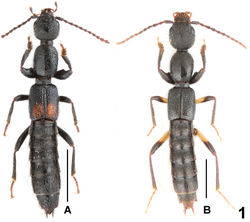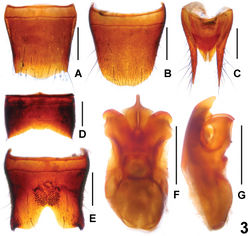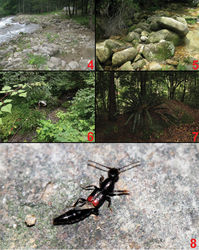Lobrathium kedian
| Notice: | This page is derived from the original publication listed below, whose author(s) should always be credited. Further contributors may edit and improve the content of this page and, consequently, need to be credited as well (see page history). Any assessment of factual correctness requires a careful review of the original article as well as of subsequent contributions.
If you are uncertain whether your planned contribution is correct or not, we suggest that you use the associated discussion page instead of editing the page directly. This page should be cited as follows (rationale):
Citation formats to copy and paste
BibTeX: @article{Peng2016ZooKeys, RIS/ Endnote: TY - JOUR Wikipedia/ Citizendium: <ref name="Peng2016ZooKeys">{{Citation See also the citation download page at the journal. |
Ordo: Coleoptera
Familia: Staphylinidae
Genus: Lobrathium
Name
Lobrathium kedian Z. Peng & L.-Z. Li sp. n. – Wikispecies link – ZooBank link – Pensoft Profile
Type material
Holotype: ♂, labelled ‘China: Guangxi Prov., Shangsi County, Shiwanda Shan, 300–500 m, 21°54'N, 107°54'E, 25–IV–2011, Peng & Zhu leg.’ (SNUC). Paratypes: 8 ♂♂, 8 ♀♀, same label data as holotype (SNUC).
Description
Measurements (in mm) and ratios: BL 9.88–10.20, FL 5.49–5.62, HL 1.37–1.42, HW 1.36–1.44, AnL 3.13–3.20, PL 1.57–1.63, PW 1.24–1.30, EL 1.35–1.39, EW 1.39–1.46, AL 1.13–1.20, HL/HW 0.97–1.00, HW/PW 1.06–1.10, HL/PL 0.85–0.88, PL/PW 1.25–1.27, EL/PL 0.84–0.87.
Habitus as in Fig. 1B. Coloration: body black, mandibles dark brown, labial palpi light brown; antennae dark brown to light brown; legs with blackish brown profemora and protibiae, basal halves of meso- and metafemora yellowish brown, distal halves gradually infuscate.
Head as wide as long, widest behind eyes; punctation coarse and very dense; interstices without microsculpture. Antenna as in Fig. 2D.
Pronotum distinctly longer than wide, with impunctate midline; punctation coarse and dense, but distinctly sparser than that of head; interstices glossy.
Elytra distinctly broader than pronotum; punctation coarse, arranged in irregular series only laterally. Hind wings approximately 1.85–2.02 times as long as elytra.
Abdomen somewhat narrower than elytra; punctation fine and dense; posterior margin of tergite VII with palisade fringe.
Male. Sternite VII (Fig. 3D) strongly transverse and with shallow median impression posteriorly, without modified setae, posterior margin broadly concave; sternite VIII (Fig. 3E) posteriorly with deep impression, this impression with a cluster of numerous short peg-setae, postero-laterally with a cluster of short black setae; posterior excision large, deep and U-shaped; aedeagus (Figs 3F, G) with apically bifid ventral process in ventral view and broad dorsal plate. Female. Posterior margin of tergite VIII (Fig. 3A) convex; sternite VIII (Fig. 3B) weakly transverse, posterior margin broadly convex; tergite IX (Fig. 3C) slender and undivided anteriorly.
Distribution and natural history
The type locality is situated in Shiwangda Shan to the south of Shangsi, southern Guangxi. The specimens were sifted from leaf litter in broad-leaved forests at altitudes of 300–500 m (Fig. 7).
Etymology
The specific name is the Chinese noun “kedian” (punctation) in apposition. It refers to the punctation of the head of Lobrathium kedian, which is denser than that of other species known from Guangxi.
Comparative notes
Lobrathium kedian shares a bifid ventral process with Lobrathium digitatum Assing, 2010 from Taiwan, but differs from it in many respects, particularly by larger body size, the shape and chaetotaxy of the male sternite VIII and by the shape of the aedeagus. For illustrations of Lobrathium digitatum see Assing (2010[1]: figures 203–210).
Original Description
- Peng, Z; Li, L; Zhao, M; 2016: A new species and additional records of Lobrathium Mulsant & Rey (Coleoptera, Staphylinidae, Paederinae) from South China ZooKeys, (568): 51-58. doi
Images
|
Other References
- ↑ Assing V (2010) On the Lathrobiina of Taiwan (Coleoptera: Staphylinidae: Paederinae). Beiträge zur Entomologie, Berlin 60: 301–361.



